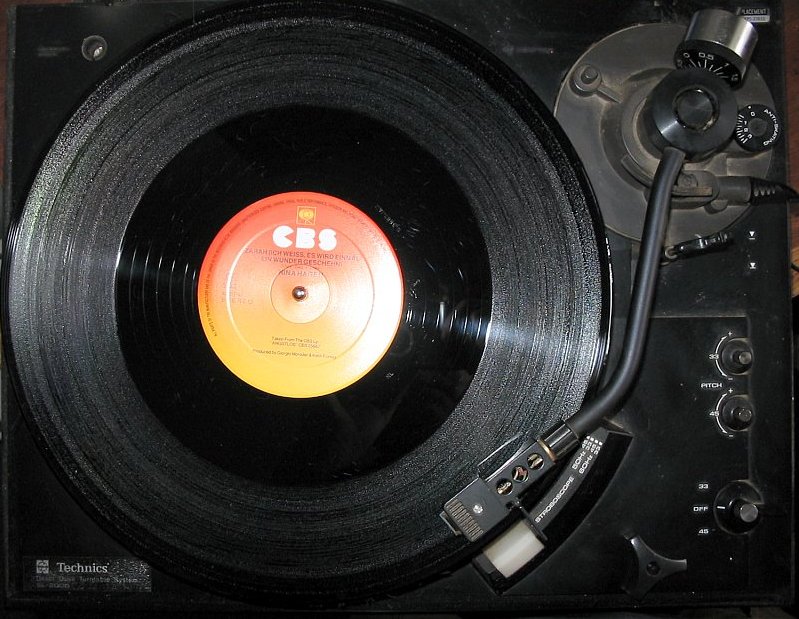In high school, I worked in a record store that was transitioning from vinyl to CDs (cassettes and albums kind of co-existed, but CDs were seen as an actual replacement). By the end of the year, we were to be CD only. I remember my manager saying that "CDs are the future - albums are obsolete!"
 |
| Accessed from Wikipedia / © 2004 by Tomasz Sienicki {{GFDL}} |
In the short term, he was right. Albums became hard to find. Turntables were hard to find, unless you were a professional DJ. Needles and other accessories became harder to find.
Of course, now we know how right AND wrong he was. For the general music listener, music has gone digital. Warehouses of vinyl are destroyed. The world's largest collection of vinyl went up for sale with sales falling through again and again (although some reports that Leo Yao the inventor of the MP3 purchased the collection in 2011, it seems that record rama still has content?)
Whenever there are digitization projects, not everything is digitized. Sometimes the original can't be found or is in too bad of shape to digitize. Sometimes it is just too low on a priority list. Sometimes copyright/licensing is an issue. In fact, with the world's largest collection of vinyl (record rama):
Furthering the supposed value of his collection, the Library of Congress conducted a study on Mawhinney’s collection that found that only 17% of the entire assortment is available on CD, meaning a whopping 83% cannot be bought anywhere at anytime.By nature, print/vinyl is not entirely replaceable. It has value beyond the "content" - beyond the text, beyond the music. With albums as with books, there are graphical elements which may be poorly represented or lacking entirely from the electronic version. When I worked in a record store our pr materials (often large scale album covers) were always a hot commodity. People would ask when we were taking down a display so they could come back for the materials (I still have a couple of them myself). I remember my friends who worked at movie theatres had the same experience - popular movie posters were stolen out of the display box on more than one occasion.
Some journals drop the original print ads when they digitize older print volumes, just focusing on the "content."Yet, those ads can provide a wealth of information to pr, marketing, insights into changes in technology, etc.
...and then there is the experience and quality of the actual content. For print books, the smell of the book, the binding, the materials, the touch of the paper, plates, sound and feel of turning the pages (I read on my kindle regularly and when I do read a print book or magazine, I am always surprised at how NOISY it is), the differences in the printing fonts and layout (especially true in older books). For albums, a similar process from opening the sleeve to removing the inner liner, putting the record on, the sound... So, a complete entire experience - auditory, kinetic, visual, tactile.
I'm not sure we are there with e-content yet and I'm not sure we want to be. Will we get to the point of completely not caring about the advantages/disadvantages of one format over another? We seem to have with newspapers. Should we try to replicate a print book in an eformat? Why not make more interactive books and harness that ability? Why not create more visual albums, like Beyonce's new project (which follows in a long tradition of music movies except that it isn't truly a movie)?
So many interesting possibilities.
Regardless, of the how those formats will evolve, the reality is that big box stores are selling turntables again. Artists are pressing vinyl again. Collectors are collecting. (I even saw vinyl lps at a big box chain over the summer). Vinyl imagery is still in use in advertising. Audio archives and museums are collecting. However, the market right now is much smaller now and seems to be aimed at target audiences like collectors.
I see a parallel here with print books. Used book stores still exist and libraries still exist. The big box stores still sell some print books. However, I will not be surprised to see print books gradually disappear from the big boxes and fewer big bookstore chains with popular reading materials.
 | |||
| Marshall Town Public Library CC Attribution: http://www.flickr.com/photos/marshalltownpubliclibrary/ |
References:
http://stoneyroads.com/when-digital-muscles-out-vinyl-a-sad-day-for-the-worlds-biggest-record-collection/
http://www.pbs.org/pov/thearchive/watch.php
http://losangeles.cbslocal.com/2014/01/01/worlds-largest-vinyl-record-mounted-atop-the-forum-in-inglewood/
http://www.messynessychic.com/2013/09/10/trying-to-sell-the-worlds-largest-record-collection/
http://www.recordrama.com/index.html
http://www.doobybrain.com/2012/05/11/1-2-1-wjeffstaple-feat-paul-mawhinney-of-record-rama/
http://abcnews.go.com/Entertainment/watch-beyonces-videos-visual-album/story?id=21207887
No comments:
Post a Comment